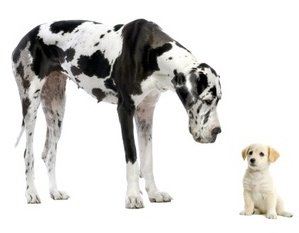Top Five Training Tips of Labrador Retriever Puppys
Labrador Retriever puppys are fantastic, fun loving little dogs. But they can quickly become more than a handful if some lessons aren't learnt early enough. Those adorable little pups will rapidly grow into powerful dogs but they won’t have lost that playfulness.
And, whilst its cute at the moment and the puppies antics have everyone laughing it isn’t so funny when they ‘mature’ and you return home to find your Labrador has devoured your sofa; nor is it much fun when he takes you for a walk instead of you being in control.
So, early training for Labrador Retriever puppys is essential but don’t worry; training certainly won’t take the mischief and playfulness out of your Lab but it will make it easier to control him when he starts to get out of hand!

Top Tip Number One
Play with your puppy
What could be easier or more fun? Playing with your puppy will not only create a bond between you but by teaching your dog to play with toys you be teaching him to focus on you. This makes training so much easier.
Play different games with different toys making each activity exciting as possible for the puppy. Keep the games short and use as many different toys as you can.
Puppies that don’t get to play with their owners or have only been exposed to playing with other dogs are difficult to train as they don’t have the trust nor focus to bond and therefore be trained by a human.
Playing with your dog is not only fun but it is essential preparation for the more structured behavioural training which will follow.
Top Tip Number Two
Join A Good Puppy Class or Group
Your puppy needs to socialise with other dogs and a training class is an ideal environment for him to meet new friends. However, it is important that you choose the right class for your dog.
Never take your dog to a new training classwithout first visiting the class on your own to see how they operate. The ideal class is one that deals exclusively with puppies (they will have other classes for older dogs), teaches training using a reward system and that mixes having a good time whilst keeping control.
If there are no classes in your area or you don’t wish to attend a formal class for whatever reason you can still make sure your puppy gets the amount of socialisation he needs by going for walks with other dog owners or mixing with them at the local pet store.
If you have more than one dog at home than socialising your puppy is made so much easier. Just leave it to your other canine friends!
Top Tip Number Three
Make Training Rewarding
Labrador Retriever Puppys will do anything for a tasty treat! By using small treats as a reward during training sessions you will encourage the puppy to do what you want him to do, and he will enjoy doing it. Bribery really does work.
Training can begin more or less from the moment your Labrador retriever puppys arrives home for the first time. Although you can’t verbally describe to the puppy what you want him to do once he finally figures out the task you are trying to teach him make sure the tasty treat reward is given immediately.
By giving the reward immediately the puppy will automatically associate that action with receiving the treat. Once he has got the hang of it and can perform the action without hesitation add the voice command.
Once he has established the link between the command-action-reward; move onto the next training routine.
The key to successfully training a puppy using a reward system is timing. By giving the reward immediately the action is performed the dog will understand what is required of him. But, delaying giving the reward will only sow confusion. So be quick!
Top Tip Number Four
Build A Bond
This should happen naturally but having a strong and loving friendship with your Labrador Retriever puppys will make training much easier and enjoyable.
Training a dog doesn’t mean shouting, bullying or dominating behaviour.
Your puppy will respond much more readily to an owner he loves and trusts. And who couldn’t build loving friendships with Labrador RetrieverPuppys ?
Top Tip Number Five
Teach Recall
Las, but definitely not least, is teaching your dog a good recall.
Being able to retrieve your dog by a vocal command when he is not on his lead can be a lifesaver. If the dog gets loose you can call him away from roads and cars or make sure he doesn’t wander off and get lost or picked up by a stranger.
Begin recall training at home, again using tasty treats as an incentive, and once he has learned to respond to his name, take the training outdoors. Keep away from other dogs and practise on a long or retractable lead.
The next step would be to practise recall when he is with other dogs. This is the most difficult part of the training as your puppy will naturally want to stay and play with the other dogs but, because he knows a treat is waiting for him, he should respond.
Mastering the recall command isn’t easy for you or your puppy but it really is the most important command to master.